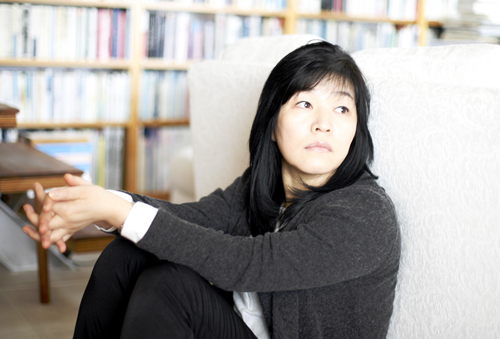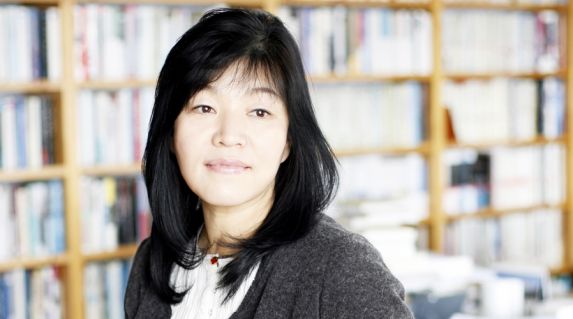Kyung-sook Shin is a celebrated author in her native South Korea. She made her literary debut in 1985, winning the Munye Joongang New Author Prize for her novella Winter Fable. She recently came to international attention with the translation of her latest book, Please Look After Mom, into a number of languages for distribution in 33 countries. The book is about a mother who disappears and the family’s desperate search to find her. It won the prestigious Man Asian Literary Prize for 2011, the Asian equivalent of the Man Booker Prize. The first Korean and first woman to win the prize, she beat celebrated Asian authors such as Haruki Murakami and Anuradha Roy. TJ’s Hong Kong correspondent David Nunan caught up with Ms. Shin at the recent Hong Kong International Literary Festival where she was a featured speaker.
 DN: When did you decide that you wanted to be a writer?
DN: When did you decide that you wanted to be a writer?
K-s S: My dream to become a writer came very naturally to me. I grew up in the rural countryside, a long way from the city. We raised animals like cows and chickens and then we would kill them and eat them. I had many siblings, many brothers who would bring books home and leave them lying around. I read them and fell in love with literature. Many of the questions I had about life were answered in the books. I loved the characters and felt that I was experiencing the same thing. So my dream to become an author was very natural to me. When I was 16, I went to Seoul to go to high school, and my love of literature got deeper there.
DN: Congratulations for winning the Man Asian Prize, that’s wonderful. As I read Please Look After Mom, I wondered how much of it was autobiographical. Your background is very similar to the daughter in the novel. The daughter grew up in very similar circumstances as you, she went to Seoul to study like you, and, like you, she is also a novelist. To what extent, then, is the novel autobiographical?
K-s S: The family in Please Look After Mom has many similarities to my own family, but it wasn’t just my family. There were many families at that time that were similar. The first chapter draws very much on my own life, but it wasn’t just about me and my family, it was about Korean society in general. Even though the story is about me to begin with, by the end of the story, it is about other people. It’s not just my story, it’s the story of other people as well. I’ve been asked that question many times before. One day, one person asked me: “So did you find your mom?” And of course, my mom was never missing. And the mother in the book is not just “mother.” She symbolizes many things – a kind of archetype of the traditional mother who is disappearing from the contemporary Korean society. But, yes, there are bits of my mother in the mom, and there are bits of my father in the dad. But there are also things about the father that is nothing like my dad. He has some nasty characteristics. In Korea, the book was turned into a play. My dad wanted to go and see the play, but I said, “No Dad, don’t go and see it.” I was worried he might think the dad was based completely on him, because the father is not a very nice man. So the book is a combination of reality and imagination.
DN: As I read it, motherhood and the centrality of motherhood came across as a main theme. Was that the inspiration for the novel?
K-s S: When I was 16 my mom took me to Seoul on the train and left me at the station. For the first time, I noticed that she looked exhausted. So I thought that one day when I become a writer I’ll write a beautiful book about motherhood and dedicate it to my mom. I wanted to write a book to celebrate her life and the lives of women in general. That was the promise I made to myself. But the novel went in a different direction and turned out to be very, very sad. I think this may be partly because in the years between when I was 16 and when I wrote the book, I came to see the sadness and struggle in my mother’s life.
DN: Another theme is the contrast between traditional and modern Korean society, which mirrors the change from traditional and modern life in Asia in general.
K-s S: Yes, the novel shows the transition from the older generation to the younger generation and also the tension between the generations. When the mom comes to visit her children in Seoul, she comes loaded with fresh food and preserved food that she has prepared for the children, and they get irritated by this.












